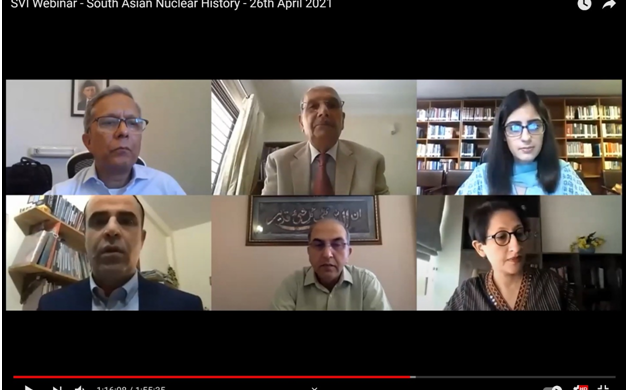
Islamabad based Strategic Vision Institute (SVI) held a webinar on April 26, 2021, on ‘South Asian Nuclear History’ to discuss the genesis, progress and dynamics of nuclearization in South Asia. The webinar speakers included Dr. Zafar Iqbal Cheema, Dr. Rabia Akhtar, Dr. Adil Sultan, Dr. Zafar Khan, and Dr. Tughral Yamin. A large number of MSc and MPhil students from DSS attended the session.
The talk provided an elaborate discourse on the history and evolution of India and Pakistan’s nuclear programmes, nuclear policies, and nuclear diplomacy in South Asia under Western, Pakistani and Indian perspectives. The talk also included discussion on geopolitical settings and strategic dynamics of nuclear posturing and proliferation in South Asia to provide a conceptual understanding of the nuclear history in the region, along with the current trends in global proliferation politics. The session was followed by a question-and-answer session, in which the DSS students participated actively.
Write up provided by Ms. Anum Akhlaq MSc DSS 04. Spring 2021
A Webinar was arranged by Strategic Vision Institute on the topic of “South Asian Nuclear History”. The Speakers included Dr. Rabia Akhtar, Dr. Adil Sultan, Prof. Dr. Zafar Khan and Dr. Tughral Yamin. Prof. Dr. Zafar Iqbal Cheema President/Executive Director, SVI, initiated the proceedings by introducing three perspectives of South Asian Nuclear History from a western, Indian and Pakistan Perspective. With regards the Pakistani perspective he highlighted the lack of concrete written material in comparison to the availability of Western and Indian discourse. Dr, Rabia Akhtar covered the theme of “History and Evolution of Nuclear Program in South Asia: Western Perspective”. In which she dwelt on. The dual strategy played by the US and other western powers with regards Pakistan and India. On one side while they turned a blind eye to Indian Nuclear Program in 60s and 70s, they opposed Pakistan’s nuclear program at all stages. India’s use of Nuclear energy for purposes other than civilian usage were in violation of agreements with Canada and United States but still the West remained complacent. She further explained the behaviour of West towards Pakistan and India during their Nuclear development phase.
Dr. Adil Sultan shed light on “Evolution of Indian Nuclear Program and Nuclear Diplomacy: A historical Overview”. The crux of his session revolves around 4 factors through which he aimed to explain true intentions of India behind their Nuclear acquisition. These as per Scott Sagan’s model were, Security, Domestic Politics and lastly and most applicable to India being Prestige. Dr. Zafar Khan in “Pakistan’s Perspective on South Asian Nuclear History,” covered the aspect as to “Why history Matters?”, “What lessons can we learn from history?” and other related questions that shows the importance of history to understand Nuclear politics in South Asia. Lastly, Dr. Tughral Yamin delivered a session on “Current Trends in Global Politics of Non-Proliferation: A South Asian Perspective,” in which he covered the global perspective rather than just focusing on South Asian perspective.
Write up provided by Ms. Anum Akhlaq MSc DSS 04. Spring 2021.